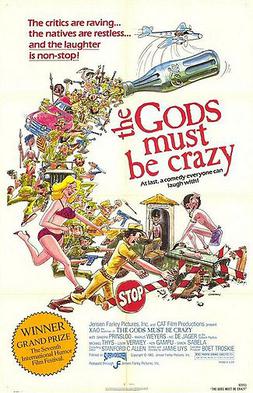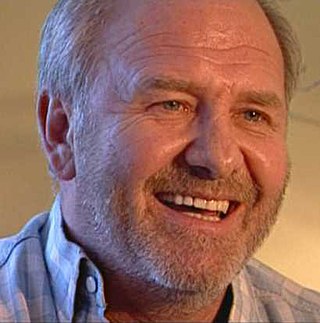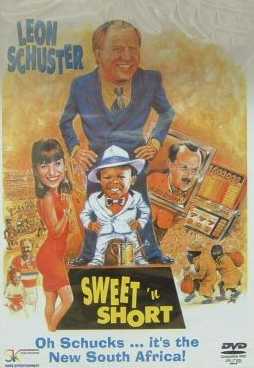
Blackface is the practice of non-black performers using burnt cork or theatrical makeup to portray a caricature of black people on stage or in entertainment.

Jonathan Paul Clegg, was a South African musician, singer-songwriter, dancer, anthropologist and anti-apartheid activist.

The Gods Must Be Crazy is a 1980 comedy film written, produced, edited and directed by Jamie Uys. An international co-production of South Africa and Botswana, it is the first film in The Gods Must Be Crazy series. Set in Southern Africa, the film stars Namibian San farmer Nǃxau ǂToma as Xi, a hunter-gatherer of the Kalahari Desert whose tribe discovers a glass Coca-Cola bottle dropped from an aeroplane, and believe it to be a gift from their gods. When Xi sets out to return the bottle to the gods, his journey becomes intertwined with that of a biologist, a newly hired village school teacher, and a band of guerrilla terrorists.

Prince Mangosuthu Gatsha Buthelezi was a South African politician and Zulu prince who served as the traditional prime minister to the Zulu royal family from 1954 until his death in 2023. He was appointed to this post by King Bhekuzulu, the son of King Solomon kaDinuzulu, a brother to Buthelezi's mother Princess Magogo kaDinuzulu. Buthelezi was chief minister of the KwaZulu bantustan during apartheid and founded the Inkatha Freedom Party (IFP) in 1975, leading it until 2019, and became its president emeritus soon after that. He was a political leader during Nelson Mandela's incarceration (1964–1990) and continued to be so in the post-apartheid era, when he was appointed by Mandela as Minister of Home Affairs, serving from 1994 to 2004.

Leon Ernest Schuster a.k.a "Schucks" was a South African filmmaker, comedian, actor, prankster and singer.
Mr. Bones is a 2001 South African comedy film directed by Gray Hofmeyr. Leon Schuster starred in the title role. He also created the story and co-wrote the screenplay. The film sets African "tradition" in opposition to forces of ambition and greed in contemporary South Africa, and plays on reversals of racial stereotypes for its humour.
Lawrence Anthony was a South African conservationist, environmentalist, explorer and bestselling author. He was the long-standing head of conservation at the Thula Thula animal reserve in Zululand, South Africa, and the Founder of The Earth Organization, a privately registered, independent, international conservation and environmental group with a strong scientific orientation. He was an international member of the esteemed Explorers Club of New York and a member of the National Council of the Southern Africa Association for the Advancement of Science, South Africa's oldest scientific association.

King Kong (1959) was a landmark South African jazz-influenced musical, billed at the time as an "all-African jazz opera".
Gray Hofmeyr is a South African film and television director.

Sweet 'n Short is a 1991 Leon Schuster movie made in South Africa. It was directed by Gray Hofmeyr.
John Matshikiza was a South African actor, theatre director, poet and journalist.
Racism in South Africa can be traced back to the earliest historical accounts of interactions between African, Asian, and European peoples along the coast of Southern Africa. It has existed throughout several centuries of the history of South Africa, dating back to the Dutch colonization of Southern Africa, which started in 1652. Before universal suffrage was achieved in 1994, White South Africans, especially Afrikaners during the period of Apartheid, enjoyed various legally or socially sanctioned privileges and rights that were denied to the indigenous African peoples. Examples of systematic racism over the course of South Africa's history include forced removals, racial inequality and segregation, uneven resource distribution, and disenfranchisement. Racial controversies and politics remain major phenomena in the country.
Zulu Love Letter is a 2004 film.
Events in the year 2019 in South Africa.
Don Clarke is a South African singer-songwriter, also known as The Songteller. Clarke is notable for his music contribution to South African culture with songs that celebrate South African sport, tell the story of heroes and support social issues.
Schuks! Your Country Needs You is a 2013 South African comedy prank movie directed by Gray Hofmeyr and written by Leon Schuster. The movie is the eighth entry in the popular South African candid camera series where Leon Schuster as the titular Schuks, Rob van Vuuren, Lare Birk, and Alfred Ntombela prank unsuspecting everyday South Africans.

Frank and Fearless is a 2018 South African buddy comedy adventure film written and directed by Gray Hofmeyr and co-written by Leon Schuster, who also stars in the movie. The film featured local actors, and used music performed by the Drakondale Girls' Choir, Till You're Free Again, won 1st prize in the Great American Song Contest (2018) in the Special Category. The film centers on poaching of rhinos.
Events in the year 2021 in South Africa.








